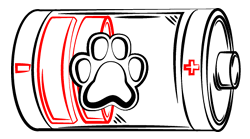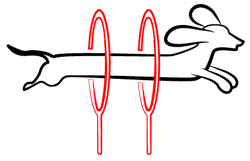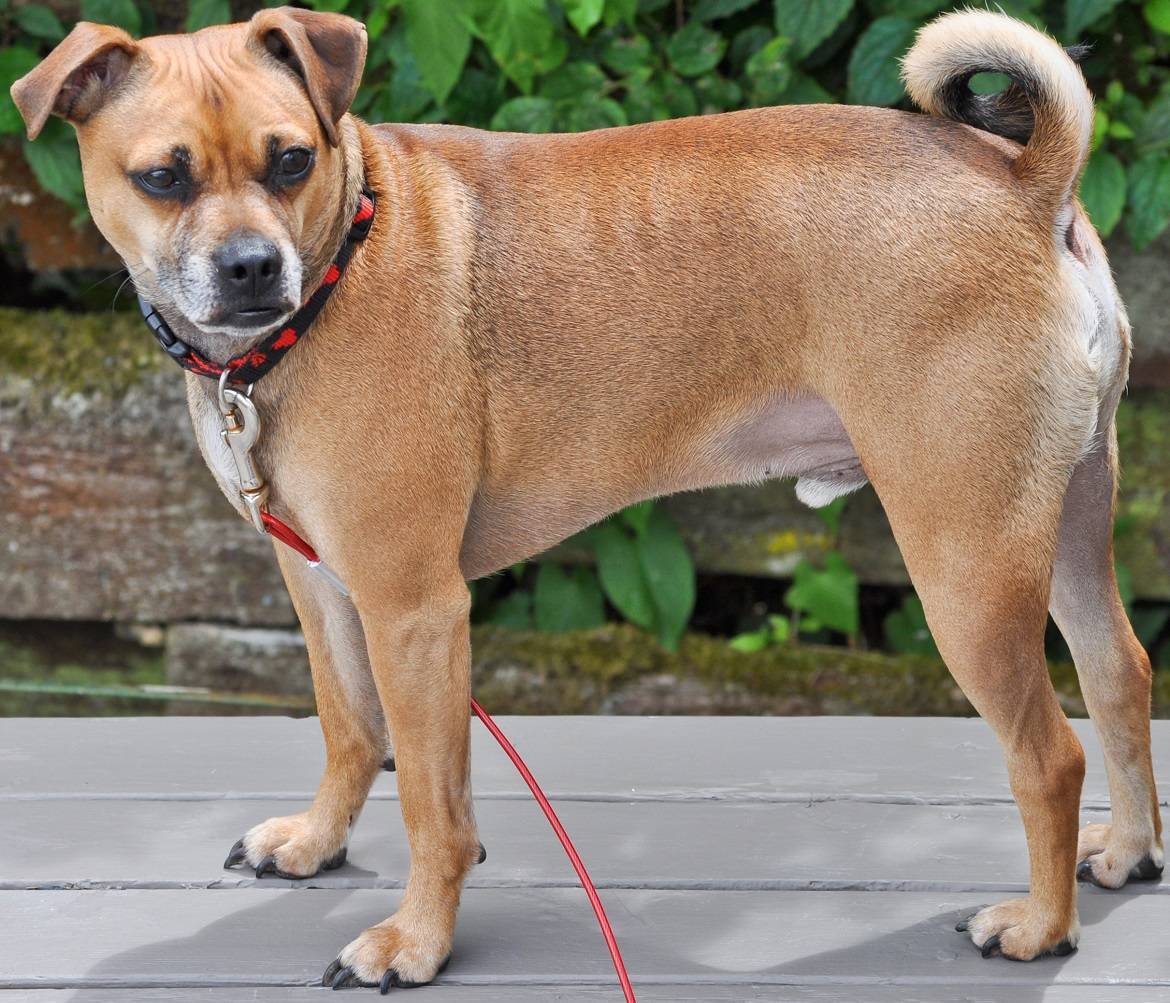
Paws ‘N’ Pups Quickview
Size
| Energy Level
| Trainability
| Paws ‘N’ Pups Rank
|
Characteristics
| Physical Characteristics: Height: 8-15” Weight: 15-30 lbs. Energy Level: Low-Moderate | Colors: The Puggle has been seen in the following colors:
|
Health & Longevity
Average Life Span: 10-15 years
Chunky and pint-sized, the Puggle is a crossbreed between a Beagle and a Pug. The parent breeds, especially Pugs, are notorious for having several health issues, some of which have been bred out when the genetics reach the Puggle offspring. However, you should still keep a close watch on your Puggle, as she may begin to exhibit signs of prevalent health conditions around 5-6 years old. You can, and should, enlist the services of a reputable vet at least twice per year. Early detection of health concerns is possible through professional examination.
Hip Dysplasia
Commonly a birth defect, this condition occurs when the joint and socket are malformed, resulting in sporadic dislocation. Symptoms include an obvious limp or awkward gait. Consequences include painful arthritis and cartilage deterioration with permanent nerve damage. Surgery is required to correct this condition.
Intervertebral Disc Disease
This condition occurs when the cushioned discs bulge from between the vertebra in the spinal column. Symptoms include muscle spasms, lethargy, an awkward gait, weakness, lack of appetite, loss of bladder control, and hunched form. It causes immense pain, and it could lead to severe nerve damage or paralysis, in the worst cases. Surgery is a must-have to correct this health issue.
Other health conditions that could affect your Puggle in their lifetime include skin allergies, hypothyroidism, Von Willebrand’s Disease, patellar luxation, epilepsy, Cushing’s Disease, Legg-Calves-Perthes, cataracts, cherry eyes, and Addison’s Disease. For a Puggle, the average lifespan ranges from 10 to 15 years.
Temperament & Train-ability
Puggles are playful, loyal, and gentle, with a touch of stubborn that may make training a challenge. These pups need lots of attention and affection. He cannot be left alone for long periods of time due to separation anxieties. Puggles, especially those in the puppy stage, are quite entertaining and quirky. They will spin, jump and play to make you laugh.
Exercise-wise, the Puggle needs moderate time outside every single day. Fenced-in backyards are a definite plus, as these pups love to romp and run. You could also take him to the dog park for a bit of fun with other dogs. Just be sure to get in plenty of early socialization to avoid dominance challenges. On rainy days when staying indoors is a better option than going out, simply walk your Puggle twice for 15-minutes each time. You should also keep toys, such as ropes and puzzle balls around for mental stimulation indoors.
Puggles can be stubborn, but their natural eagerness to please gets the better of them. Training sessions should be easy, as the pups are clever, but sometimes selective about what they learn. Use consistent, positive training techniques to earn respect and gain compliance. Praise and encourage him often. Keep treats nearby to reward him for good behavior.
Grooming
Both the Pug and the Beagle have short, coarse coats, so grooming is super-easy and manageable for a Puggle. While these pups do shed quite a bit, particularly in hot weather, a daily brushing can take care of excess hair. Invest in a vacuum to clean up any loose hairs on your furniture, floor, or clothing. Shedding is worse in the heat than the cold.
Bathe your Puggle whenever he needs it, i.e. whenever he is smelly or obviously dirty. Always use a gentle dog shampoo to keep the natural oils in his fur intact. Puggles, thanks to their Pug genetics, may also have a wrinkle or two, especially around their face. Use a wipe to clear away wrinkle-debris daily. Too much sweat or dirt in their wrinkles could cause a bad infection.
Diet
Puggles vary in size, but the average crossbreed needs 2 cups of dry, high-quality kibble, divided into two meals per day. These pups can be overeaters, so keep a good meal schedule to get them used to eating at a specific time. This helps them maintain a satisfied, full belly between meals. You could offer a couple of meaty, bite-sized treats for good behavior throughout the day.
Puggles, because of their Pug genetics, are intolerant of extreme weather, especially in the summer months. Keep your Pug cool with air-conditioning or fans and invest in an automatic water dish to help him stay hydrated. Throw in a few ice cubes for a chilly surprise.
Looking for a Puggle?
 Find A Puggle Breeder |  Puggle Puppies For Sale |  Adopt A Puggle |
Cost
Puggles are popular crossbreeds, but there is also an abundance of them. Many of them, over the years, have been abandoned for one reason or another, so check your local rescue group or animal shelter before you peruse the web for a breeder. You could give a mature Puggle a second chance at a happy, healthy life in a new forever home.
Adoption fees depend on state and county regulations, so they vary greatly from one area to another. However, the general range is between $75 to $250. This excludes the costs of vaccines, updated vet visits, and spay or neuter services. If you want the shelter to assist in these services, you could pay up to $500 in Puggle adoption costs.
If you are searching for a breeder, make sure the breeder is reputable, reliable, and overflowing with good reviews. There are heaps of bad breeders in the world who put Puggles at the forefront of their puppy mill businesses, so you have to be careful. You can start your search with our list of breeders. Ask to see health histories of both parent breeds, as well as documentation of the first deworming and initial vet check-up. Any trustworthy breeder will happily and quickly give you the information you ask for. You should also take a look at the parent breeds before you buy, as there may be some noticeable health concerns that you may want to ask about.
The average Puggle pup, from a breeder, ranges from $300 to $900. You also have to factor in the costs of toys, nutritious dog foods, updated vaccinations, semi-annual vet check-ups, and blood tests. Altogether, the price for a Puggle could be well-over $1,200.
Paws ‘N’ Pups Ranking
Paws ‘N’ Pups ranks every breed out of 4 with 1 being easiest to integrate into your life and 4 being the toughest – The lower the ranking the better.
Ranking takes into account a few basic factors including cost, skill level needed, high vs low maintenance and how critical regular training is to success. Puggles are a 2 on the integration scale. These pups have a natural eagerness to please, but it could be rivaled by their natural stubbornness. It takes time and effort to train your Puggle. However, once they pick up the simple commands, you have a well-behaved, well-trained, well-rounded pup who would make the perfect family companion.
Breeds Similar To Puggle
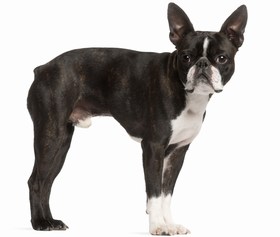 Boston Terrier | 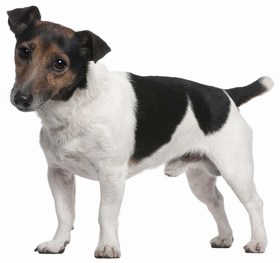 Jack Russell Terrier | 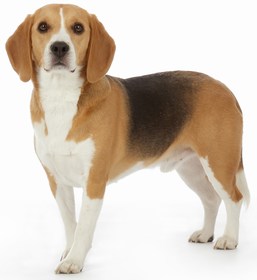 Beagle | 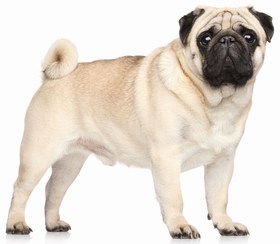 Pug |


